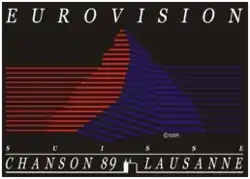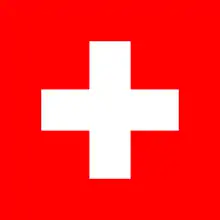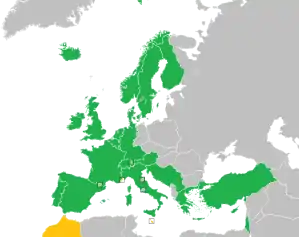Eurovision Song Contest 1989
The Eurovision Song Contest 1989 was the 34th annual Eurovision Song Contest. It was held on 6 May 1989 in Lausanne, Switzerland, after Celine Dion's victory in Dublin the previous year. The program was presented by Lolita Morena and Jacques Deschenaux. Riva, representing Yugoslavia, won with the song "Rock Me". This was the only victory for Yugoslavia as a unified state.[1] Furthermore, this was the first victory for one of the Balkan countries and this was the first winning song to be performed in one of the Slavic languages.
| Eurovision Song Contest 1989 | |
|---|---|
 | |
| Dates | |
| Grand final | 6 May 1989 |
| Host | |
| Venue | Palais de Beaulieu Lausanne, Switzerland |
| Presenter(s) | |
| Musical director | Benoit Kaufman |
| Directed by | Alain Bloch |
| Executive supervisor | Frank Naef |
| Executive producer | Raymond Zumsteg |
| Host broadcaster | Swiss Broadcasting Corporation (SRG SSR) |
| Opening act | "Ne partez pas sans moi" and "Where Does My Heart Beat Now" performed by Celine Dion |
| Interval act | Guy Tell |
| Website | eurovision |
| Participants | |
| Number of entries | 22 |
| Debuting countries | None |
| Returning countries | |
| Non-returning countries | None |
Participation map
| |
| Vote | |
| Voting system | Each country awarded 12, 10, 8–1 point(s) to their 10 favourite songs |
| Nul points | |
| Winning song | "Rock Me" |
Location
.jpg.webp)
Lausanne is a city in the French-speaking part of Switzerland, and the capital and biggest city of the canton of Vaud. The city is situated on the shores of Lake Geneva (French: Lac Léman, or simply Le Léman).[2] It faces the French town of Évian-les-Bains, with the Jura Mountains to its north-west. Lausanne is located 62 kilometres (38.5 miles) northeast of Geneva.
Palais de Beaulieu, a convention and exhibition centre, was chosen to host the 1989 contest. The centre includes the 1,844 seat Théâtre de Beaulieu concert, dance and theatre hall. Inaugurated in 1954, the Théâtre de Beaulieu is the biggest theatre in Switzerland. The Eurovision Song Contest took place in the Hall 6 + 7 of the Palais, to the right from the main hall and the theatre.
Contest overview
The United Kingdom's Ray Caruana, lead singer with Live Report was outspoken about coming second to what he considered a much less worthy song.[3] They had been defeated by 7 points.
Two of the performers, Nathalie Pâque and Gili Natanael were respectively 11 and 12 years old at their time of competing. Due to bad publicity surrounding their participation, the European Broadcasting Union introduced the rule stating no performer is allowed to take part before the year of their 16th birthday.[4]
The previous year's winner, Celine Dion, opened the show with a mimed performance of her winning song and a mimed performance of her first English-language single, "Where Does My Heart Beat Now". The song became a top ten hit in the US a year later - effectively launching her into international success.[1]
Returning artists
Only one artist returned this year to represent their country for a second time. Marianna Efstratiou of Greece was a backing vocalist of the Greek band "Bang" in 1987.
Conductors
Each performance (except Austria, Iceland and Germany) had a conductor who led the orchestra. Unlike in most years and like in 1988, the conductors took their bows after each song, not before.
 Italy – Mario Natale
Italy – Mario Natale Israel – Shaike Paikov
Israel – Shaike Paikov Ireland – Noel Kelehan
Ireland – Noel Kelehan Netherlands – Harry van Hoof
Netherlands – Harry van Hoof Turkey – Timur Selçuk
Turkey – Timur Selçuk.svg.png.webp) Belgium – Freddy Sunder
Belgium – Freddy Sunder United Kingdom – Ronnie Hazlehurst
United Kingdom – Ronnie Hazlehurst Norway – Pete Knutsen
Norway – Pete Knutsen Portugal – Luís Duarte
Portugal – Luís Duarte Sweden - Anders Berglund
Sweden - Anders Berglund Luxembourg – Benoît Kaufman
Luxembourg – Benoît Kaufman Denmark – Henrik Krogsgård, Benoît Kaufman
Denmark – Henrik Krogsgård, Benoît Kaufman Austria – No conductor
Austria – No conductor Finland – Ossi Runne
Finland – Ossi Runne France – Guy Matteoni
France – Guy Matteoni Spain – Juan Carlos Calderón
Spain – Juan Carlos Calderón.svg.png.webp) Cyprus – Charis Andreadis
Cyprus – Charis Andreadis Switzerland – Benoît Kaufman
Switzerland – Benoît Kaufman Greece – George Niarchos
Greece – George Niarchos Iceland – No conductor
Iceland – No conductor Germany – No conductor
Germany – No conductor.svg.png.webp) Yugoslavia – Nikica Kalogjera
Yugoslavia – Nikica Kalogjera
Results
Voting structure
Each country had a jury who awarded 12, 10, 8, 7, 6, 5, 4, 3, 2, 1 point(s) for their top ten songs. There was also a change of rule in case of a tie; prior to 1989, both countries would perform their songs again until a final decision was made. However from 1989 onwards, if there was a tie at the end of the voting, the country that scored the most twelves would be declared the winner. If there was still a tie, the winner was the country that scored the most tens. And if there still was a tie after that, both countries would be declared joint winners.
Score sheet
| Juries | ||||||||||||||||||||||||
|---|---|---|---|---|---|---|---|---|---|---|---|---|---|---|---|---|---|---|---|---|---|---|---|---|
| Italy | 56 | 7 | 10 | 12 | 6 | 2 | 4 | 7 | 8 | |||||||||||||||
| Israel | 50 | 1 | 7 | 3 | 2 | 5 | 5 | 5 | 7 | 5 | 3 | 7 | ||||||||||||
| Ireland | 21 | 7 | 3 | 3 | 2 | 4 | 2 | |||||||||||||||||
| Netherlands | 45 | 10 | 3 | 3 | 1 | 4 | 4 | 7 | 6 | 1 | 6 | |||||||||||||
| Turkey | 5 | 1 | 4 | |||||||||||||||||||||
| Belgium | 13 | 5 | 5 | 2 | 1 | |||||||||||||||||||
| United Kingdom | 130 | 6 | 7 | 4 | 7 | 1 | 12 | 12 | 10 | 12 | 1 | 8 | 6 | 12 | 10 | 2 | 2 | 12 | 6 | |||||
| Norway | 30 | 2 | 2 | 5 | 8 | 2 | 6 | 4 | 1 | |||||||||||||||
| Portugal | 39 | 4 | 2 | 1 | 3 | 7 | 6 | 2 | 8 | 6 | ||||||||||||||
| Sweden | 110 | 6 | 6 | 4 | 8 | 8 | 6 | 12 | 12 | 2 | 5 | 8 | 3 | 8 | 2 | 8 | 12 | |||||||
| Luxembourg | 8 | 5 | 3 | |||||||||||||||||||||
| Denmark | 111 | 5 | 1 | 10 | 12 | 6 | 4 | 10 | 10 | 2 | 12 | 3 | 7 | 12 | 6 | 10 | 1 | |||||||
| Austria | 97 | 12 | 8 | 3 | 12 | 7 | 4 | 1 | 2 | 10 | 8 | 12 | 8 | 5 | 5 | |||||||||
| Finland | 76 | 10 | 8 | 6 | 10 | 1 | 4 | 4 | 3 | 10 | 7 | 3 | 10 | |||||||||||
| France | 60 | 3 | 5 | 6 | 4 | 5 | 1 | 8 | 3 | 5 | 3 | 7 | 5 | 2 | 3 | |||||||||
| Spain | 88 | 8 | 2 | 7 | 7 | 4 | 10 | 8 | 8 | 4 | 10 | 10 | 10 | |||||||||||
| Cyprus | 51 | 2 | 3 | 1 | 6 | 6 | 8 | 2 | 4 | 7 | 12 | |||||||||||||
| Switzerland | 47 | 4 | 4 | 10 | 8 | 8 | 3 | 2 | 1 | 7 | ||||||||||||||
| Greece | 56 | 1 | 1 | 5 | 6 | 10 | 1 | 4 | 12 | 12 | 4 | |||||||||||||
| Iceland | 0 | |||||||||||||||||||||||
| Germany | 46 | 7 | 2 | 5 | 1 | 5 | 6 | 7 | 1 | 6 | 3 | 3 | ||||||||||||
| Yugoslavia | 137 | 12 | 12 | 8 | 12 | 10 | 12 | 7 | 4 | 8 | 5 | 10 | 10 | 7 | 3 | 5 | 5 | 6 | 1 | |||||
12 points
Below is a summary of all 12 points in the final:
|
|
Commentators
Participating countries
 Italy – Gabriella Carlucci (Raiuno)[7]
Italy – Gabriella Carlucci (Raiuno)[7] Israel – No commentator (IBA Television)
Israel – No commentator (IBA Television) Ireland – Ronan Collins and Michelle Rocca (RTÉ 1)
Ireland – Ronan Collins and Michelle Rocca (RTÉ 1) Netherlands – Willem van Beusekom (Nederland 3)[8]
Netherlands – Willem van Beusekom (Nederland 3)[8] Turkey – Bülend Özveren (TV1)
Turkey – Bülend Özveren (TV1).svg.png.webp) Belgium – Dutch: Luc Appermont (BRT TV1),[9] French: Jacques Mercier (RTBF La Une)[10]
Belgium – Dutch: Luc Appermont (BRT TV1),[9] French: Jacques Mercier (RTBF La Une)[10] United Kingdom – Terry Wogan (BBC 1)[11]
United Kingdom – Terry Wogan (BBC 1)[11] Norway – John Andreassen (NRK)[12]
Norway – John Andreassen (NRK)[12] Portugal – Ana Zanatti (RTP1)[13]
Portugal – Ana Zanatti (RTP1)[13] Sweden – Jacob Dahlin (Kanal1)[14]
Sweden – Jacob Dahlin (Kanal1)[14] Luxembourg – Valérie Sarn (RTL Télévision)[15]
Luxembourg – Valérie Sarn (RTL Télévision)[15] Denmark – Jørgen de Mylius (DR TV)[16]
Denmark – Jørgen de Mylius (DR TV)[16] Austria – Ernst Grissemann (FS1)[17]
Austria – Ernst Grissemann (FS1)[17] Finland – Heikki Harma (YLE TV1)[18]
Finland – Heikki Harma (YLE TV1)[18] France – Lionel Cassan (Antenne 2)[15]
France – Lionel Cassan (Antenne 2)[15] Spain – Tomás Fernando Flores (TVE2)[19]
Spain – Tomás Fernando Flores (TVE2)[19].svg.png.webp) Cyprus – Neophytos Taliotis (RIK)[20]
Cyprus – Neophytos Taliotis (RIK)[20] Switzerland – German: Bernard Thurnheer (DRS), French: Thierry Masselot (TSR), Italian: Giovanni Bertini (TSI)
Switzerland – German: Bernard Thurnheer (DRS), French: Thierry Masselot (TSR), Italian: Giovanni Bertini (TSI) Greece – Dafni Bokota (ET1)[21]
Greece – Dafni Bokota (ET1)[21] Iceland – Arthúr Björgvin Bollason (Sjónvarpið)[22]
Iceland – Arthúr Björgvin Bollason (Sjónvarpið)[22] Germany – Thomas Gottschalk (Erstes Deutsches Fernsehen)[23]
Germany – Thomas Gottschalk (Erstes Deutsches Fernsehen)[23].svg.png.webp) Yugoslavia – Oliver Mlakar (TVZ 1 and TVB2), Marjeta Keršič Svetel (TVLJ1)
Yugoslavia – Oliver Mlakar (TVZ 1 and TVB2), Marjeta Keršič Svetel (TVLJ1)
Radio
Some participating countries did not provide radio broadcasts for the event; the ones who did are listed below.
 Italy – Antonio De Robertis (Rai Radio 2)
Italy – Antonio De Robertis (Rai Radio 2) Israel – Yigal Ravid (Reshet Gimel)
Israel – Yigal Ravid (Reshet Gimel) Ireland – Larry Gogan (RTÉ Radio 1)
Ireland – Larry Gogan (RTÉ Radio 1) Netherlands – Lex Harding (Radio 3)
Netherlands – Lex Harding (Radio 3) Turkey – Fatih Orbay (TRT Radyo 3)
Turkey – Fatih Orbay (TRT Radyo 3).svg.png.webp) Belgium – Dutch: Ann Lepère (BRT Radio 2), French: Claude Delacroix (RTBF La Première)
Belgium – Dutch: Ann Lepère (BRT Radio 2), French: Claude Delacroix (RTBF La Première) United Kingdom – Ken Bruce (BBC Radio 2)
United Kingdom – Ken Bruce (BBC Radio 2) Norway – Erik Heyerdahl (NRK P2)
Norway – Erik Heyerdahl (NRK P2) Portugal – TBC (RDP Antena 2)
Portugal – TBC (RDP Antena 2) Sweden – Kent Finell and Janeric Sundquist (SR P3)[14]
Sweden – Kent Finell and Janeric Sundquist (SR P3)[14] Luxembourg – André Torrent (RTL Radio)
Luxembourg – André Torrent (RTL Radio) Denmark – Kurt Helge Andersen (DR P3)
Denmark – Kurt Helge Andersen (DR P3) Austria – Hans Leitinger (Hitradio Ö3)
Austria – Hans Leitinger (Hitradio Ö3) Finland – Jake Nyman and Kati Bergman (YLE 2-verkko)
Finland – Jake Nyman and Kati Bergman (YLE 2-verkko) France – Patrick Sabatier (France Inter)
France – Patrick Sabatier (France Inter).svg.png.webp) Cyprus – Pavlos Pavlou (CyBC Radio Two)
Cyprus – Pavlos Pavlou (CyBC Radio Two) Greece – Dimitris Konstantaras (Proto Programma)
Greece – Dimitris Konstantaras (Proto Programma) Germany – Peter Urban (NDR Radio 2)
Germany – Peter Urban (NDR Radio 2)
Spokespersons
 Italy - Pepi Franzelin
Italy - Pepi Franzelin Israel - Yitzhak Shim'oni[24]
Israel - Yitzhak Shim'oni[24] Ireland - Eileen Dunne
Ireland - Eileen Dunne Netherlands - Joop van Os
Netherlands - Joop van Os Turkey - Canan Kumbasar
Turkey - Canan Kumbasar.svg.png.webp) Belgium - An Ploegaerts[25]
Belgium - An Ploegaerts[25] United Kingdom - Colin Berry
United Kingdom - Colin Berry Norway – Sverre Christophersen[26]
Norway – Sverre Christophersen[26] Portugal - Margarida Mercês de Melo[13]
Portugal - Margarida Mercês de Melo[13] Sweden - Agneta Bolme-Börjefors[14]
Sweden - Agneta Bolme-Börjefors[14] Luxembourg - Jean-Luc Bertrand
Luxembourg - Jean-Luc Bertrand Denmark - Bent Henius
Denmark - Bent Henius Austria - Tilia Herold
Austria - Tilia Herold Finland - Solveig Herlin[27]
Finland - Solveig Herlin[27] France - Marie-Ange Nardi[28]
France - Marie-Ange Nardi[28] Spain - Matilde Jarrín
Spain - Matilde Jarrín.svg.png.webp) Cyprus - Anna Partelidou[20]
Cyprus - Anna Partelidou[20] Switzerland - Michel Stocker[29]
Switzerland - Michel Stocker[29] Greece - Fotini Giannoulatou[30]
Greece - Fotini Giannoulatou[30] Iceland - Erla Björk Skúladóttir[22]
Iceland - Erla Björk Skúladóttir[22] Germany - Gabi Schnelle
Germany - Gabi Schnelle.svg.png.webp) Yugoslavia - Dijana Čulić
Yugoslavia - Dijana Čulić
National jury members
 Ireland – Geraldine Cooper
Ireland – Geraldine Cooper.svg.png.webp) Belgium – Jan Demulder
Belgium – Jan Demulder United Kingdom – Carol Kelly
United Kingdom – Carol Kelly Portugal – Vasco da Camara Pereira
Portugal – Vasco da Camara Pereira Spain – Luis Merino (student, Eurovision fan and AEV president), Blanca Andreu (poet), Javier Tomeo (playwright), Ángeles Fernández (student), Antonio Banderas (actor), Isabel Mestres (actress), Luis Miguel Calvo (bullfighter), Emma Penella (actress), Antonio Ozores (actor), Pitita Ridruejo (writer), Javier Clemente (football coach), Dolly Fontana (public relations), Carlos Ferrando (journalist), Tatiana Magdalena García (hairdresser), Félix Cábez (scriptwriter), Charo Pascual (physicist and weatherwoman)[31]
Spain – Luis Merino (student, Eurovision fan and AEV president), Blanca Andreu (poet), Javier Tomeo (playwright), Ángeles Fernández (student), Antonio Banderas (actor), Isabel Mestres (actress), Luis Miguel Calvo (bullfighter), Emma Penella (actress), Antonio Ozores (actor), Pitita Ridruejo (writer), Javier Clemente (football coach), Dolly Fontana (public relations), Carlos Ferrando (journalist), Tatiana Magdalena García (hairdresser), Félix Cábez (scriptwriter), Charo Pascual (physicist and weatherwoman)[31] Switzerland – Chantal Oes, Pierre Gumy
Switzerland – Chantal Oes, Pierre Gumy
See also
References
- "Eurovision Song Contest 1989". Eurovision.tv. Retrieved 8 July 2013.
- "03 - Suisse sud-ouest". Swiss National Map 1:200 000 - Switzerland on four sheets. Federal Office of Topography, swisstopo, Swiss Federal Department of Defence, Civil Protection and Sport. 2009. Archived from the original on 11 April 2014. Retrieved 17 April 2014.
- "Grand Final: 1989". BBC.co.uk. Retrieved 8 July 2013.
- O'Connor, John Kennedy (2010). The "Eurovision Song Contest": The Official History. Carlton Books Ltd. ISBN 1847325211.
- "Eurovision Song Contest 1989". The Diggiloo Thrush. Retrieved 5 March 2012.
- "Eurovision Song Contest 1989". 4Lyrics.eu. Retrieved 16 September 2020.
- "Anna Oxa e Fausto Leali Avrei voluto Eurofestival 1989". YouTube. Retrieved 2012-08-10.
- "Welkom op de site van Eurovision Artists". Eurovisionartists.nl. Retrieved 2012-08-10.
- Adriaens, Manu & Loeckx-Van Cauwenberge, Joken. Blijven kiken!. Lannoo, Belgium. 2003 ISBN 90-209-5274-9
- "La Yougoslavie Decroche L'Eurovision". Archives.lesoir.be. Retrieved 2012-08-10.
- Eurovision Song Contest 1989 BBC Archives Archived October 17, 2015, at the Wayback Machine
- "Hvem kommenterte før Jostein Pedersen? - Debattforum". Nrk.no. Archived from the original on November 2, 2012. Retrieved 2012-08-10.
- "Comentadores Do ESC - escportugalforum.pt.vu | o forum eurovisivo português". 21595.activeboard.com. Archived from the original on April 21, 2012. Retrieved 2012-08-10.
- "Infosajten.com". Infosajten.com. Archived from the original on July 18, 2012. Retrieved 2012-08-10.
- Christian Masson. "1989 - Lausanne". Songcontest.free.fr. Retrieved 2012-08-10.
- "Forside". esconnet.dk. Archived from the original on 2012-03-24. Retrieved 2012-08-10.
- Archived October 24, 2007, at the Wayback Machine
- "Selostajat ja taustalaulajat läpi vuosien? • Viisukuppila". Viisukuppila.fi. Retrieved 2012-08-10.
- "FORO FESTIVAL DE EUROVISIÓN • Ver Tema - Uribarri comentarista Eurovision 2010". Eurosongcontest.phpbb3.es. Archived from the original on 2012-03-17. Retrieved 2012-08-10.
- Savvidis, Christos (OGAE Cyprus)
- "Η Δάφνη Μπόκοτα και η EUROVISION (1987-2004)". Retromaniax.gr. Archived from the original on 2012-09-12. Retrieved 2012-08-10.
- "Söngvakeppnin: Fjórir valdir til að syngja bakraddir". Mbl.is. Retrieved 2012-08-10.
- "Eurovision Song Contest 1989". Ecgermany.de. Retrieved 2012-08-10.
- "פורום אירוויזיון". Sf.tapuz.co.il. 1999-09-13. Archived from the original on October 8, 2011. Retrieved 2012-08-10.
- Video on YouTube
- Dyrseth, Seppo (OGAE Norway)
- "Selostajat ja taustalaulajat läpi vuosien? • Viisukuppila". Viisukuppila.fi. Retrieved 2012-08-10.
- "Concours Eurovision de la Chanson • Consulter le sujet - Porte-paroles des jurys des pays francophones". Eurovision.vosforums.com. Retrieved 2012-08-10.
- Baumann, Peter Ramón (OGAE Switzerland)
- "Εκφωνητές της ΕΡΤ για τις ψήφους της Ελλάδας στην EUROVISION - Page 3". Retromaniax.gr. Archived from the original on 2012-09-11. Retrieved 2012-08-10.
- "000webhost.com - free web hosting provider". Eurofestival.host22.com. Archived from the original on 2011-08-15. Retrieved 2012-08-10.
